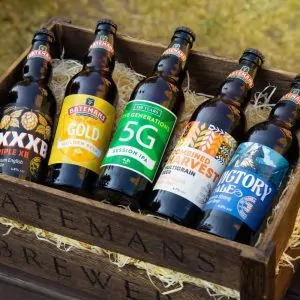April Brewsletter 2025
Batemans Brewery: Harry Takes Over the Brewery
Harry Bateman took over the family brewery just before the First World War. A distinguished, Victorian-looking gentleman—always impeccably dressed with a full moustache—he was dedicated to expanding the business. Under his leadership, Batemans Brewery grew to serve over 100 pubs.
Brewing Through Wartime Challenges
At first, the war had little impact on brewers, but rising beer duty made business difficult. Fortunately, special allowances for ‘harvest beer’ and lower-strength beers for munitions workers allowed Harry to continue brewing. He even supplied military production sites in Lincoln, Scunthorpe, and Grimsby.
The government briefly considered nationalizing the brewing industry due to concerns over drunkenness in munitions factories, but economic constraints prevented this from happening.
Building a Brewery Legacy
In 1918, Harry purchased his father George’s share of the brewery—including two pubs—for just over £4,000. Despite workforce shortages caused by the war, he continued expanding. With the Wainfleet railway only 100 yards from the brewery, he was able to supply customers beyond the local area.
Harry soon owned a small estate of pubs, most within five miles of the brewery. In the same year, he acquired J.E. Ridlington & Son, a wine merchant in Boston with a bonded warehouse and a pub—the Ship Tavern. The £2,800 purchase was made possible by a £2,000 loan from the previous owner.
His expansion continued:
- 1920: Purchased two lorries to replace dray horses and bought a motor car—upgrading from his trusty motorbike.
- Post-War Struggles: Rising costs and shorter working weeks led to financial losses, but Harry pressed on.
- By 1930: He owned 57 pubs and acquired two breweries—Burgh le Marsh Brewery and Hundleby Brewery —funded by loans from local farmers and a supportive bank manager.
The Iconic Windmill & a Lasting Legacy
In 1929, Harry purchased Salem Bridge windmill, which later became a key part of Batemans Brewery’s branding. Built around 1820 as a flour mill, it had ceased operations by 1913, with its sails removed in 1921.
It was during this period that Harry coined the slogan “Good Honest Ales”, a phrase that remained a hallmark of the brewery for nearly a century.
It seemed like smooth sailing for Harry, but stormy seas lay ahead…


